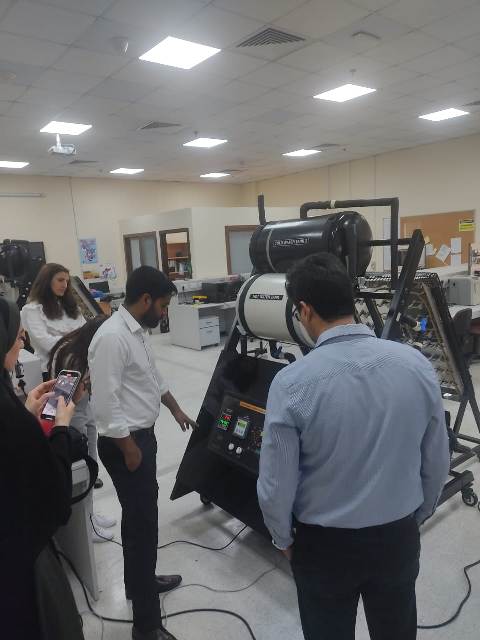Ecosense installed a Solar Thermal Lab at the University of Sharjah, Sharjah
The University of Sharjah is renowned as one of the most sought-after institutions in Sharjah, UAE.

The University of Sharjah is renowned as one of the most sought-after institutions in Sharjah, UAE.
The University of Sharjah is renowned as one of the
most sought-after institutions in Sharjah, UAE. Demonstrating a strong
commitment to Renewable Energy research, the university has invested in a Solar
Thermal (FPC) Training system and a Solar Concentrator (Parabolic Trough)
Training system. These acquisitions were facilitated through Edutech Middle
East in partnership with Ecosense for product supply.
Ecosense's Solar Thermal Labs provide a comprehensive
platform for end-to-end learning and training in the Solar Thermal field. The
Solar Thermal Lab comprises four distinct products that cover the entire
spectrum of concepts related to Solar Thermal technology, usage, and
installation, further enriching the educational experience for students.
Solar Thermal Training
System is a small model of real-time water heating system and can be used for
the characterization and different heat transfer analysis. Different aspects
like efficiency, overall heat loss coefficient, and heat removal factor and
their corresponding calculations can be demonstrated with the help of this
system. The special feature of this system is to perform experiments with
different wind speeds, different fluid temperatures, and different flow speeds.
This system can be divided in three parts viz. main collector system, measuring
unit and artificial light unit.
Main Collector system
consists of a Flat Plate collector with temperature, flow and pressure sensors
to measure temperature, flow and pressure of fluid. Measuring unit consists of
a measurement panel displaying different parameters and Artificial light unit/
heat generating unit is a Halogen lamp panel to uniformly illuminate the flat
plate collector inside a Lab. Artificial Light facilitates a user to do his/her
work without depending on climatic changes in the environment.
Modular and scalable
design of the system allows user to move the system in and out of lab easily
and conduct experiment with artificial lights as well as actual sunlight. Using
the system, a user will be able to study and understand working and operation
of a flat plate collector water heating system and its two modes of operation.
In the thermosyphonic
mode experiments, the aim is to assess the performance of flat plate solar
collectors under different natural flow conditions. This involves studying
parameters such as UL (utilization factor), FR (flow rate), and efficiency
across varying radiation levels, inlet water temperatures, wind speeds, and
tilt angles. These experiments provide insights into how the collectors respond
to environmental factors and how their efficiency varies under different
thermosyphonic conditions.
On the
other hand, the forced mode experiments focus on the collector's
behavior under controlled flow conditions. By examining UL, FR, and eficiency
under fixed input parameters, diverse flow rates, radiation levels, inlet water
temperatures, wind speeds, and incident angles, these experiments shed light on
the collector's adaptability to forced flow scenarios. Understanding the
collector's performance under both natural and controlled flow conditions is
crucial for optimizing its efficiency across a range of practical applications.

Performance Factors Analysis: Students can determine
various performance factors such as heat loss coefficient (UL), heat removal
factor (FR), and overall efficiency of
the parabolic trough collector. They can investigate how these factors change
under different conditions, such as varying solar insulation, flow rates,
insulation thickness, inlet fluid temperatures, wind speeds, and ambient
temperatures.
Optimization Studies: Students can find the optimum flow rate of
the fluid for minimizing heat losses or maximizing heat gain under different
insulation thicknesses. This type of study helps them understand the practical
considerations for optimizing system performance.
Ecosense also conducted a demonstration of equipment for
training Professors and Scholars. This training program was focused on
educating and training the professors, scholars, and technicians in Solar
Parabolic Trough Collector Technology who will further train thousands of
students and professionals to start their career or business in this very
field.